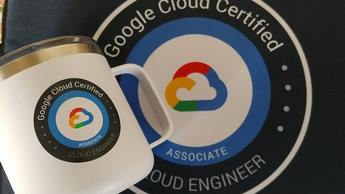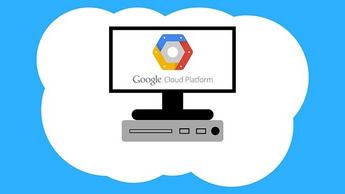Use VCE Exam Simulator to open VCE files

Google Certification Exam Dumps, Practice Test Questions and Answers
Google Certification Exam Dumps, Google Certification Practice Test Questions
Prepared by Leading IT Trainers with over 15-Years Experience in the Industry, Examsnap Providers a complete package with Google Certification Practice Test Questions with Answers, Video Training Course, Study Guides, and Google Certification Exam dumps in VCE format. Google Certification VCE Files provide exam dumps which are latest and match the actual test. Google Certification Practice Test which contain verified answers to ensure industry leading 99.8% Pass Rate Read More.
A Google certification is a professional credential designed to equip individuals with job-ready skills in high-growth, technology-driven fields. These online programs are developed by experts at Google and are structured to prepare learners for entry-level roles in a matter of months, not years. The curriculum is meticulously crafted to be practical and hands-on, focusing on the specific competencies and tools that employers are actively seeking. Unlike traditional academic pathways that often emphasize theory, a Google certification prioritizes applied knowledge, ensuring that graduates can make a tangible impact from their first day on the job.
The courses cover a range of in-demand career areas, including data analytics, IT support, project management, UX design, and digital marketing. Each program is broken down into a series of manageable courses, complete with video lectures, readings, quizzes, and hands-on projects. This format allows learners to build a robust portfolio of work that they can showcase to potential employers. The ultimate goal of each Google certification is to provide a direct and accessible path to a new or improved career, breaking down the barriers of cost, time, and prior experience that often hinder professional development.
Google certifications are created for a diverse audience, but they are particularly beneficial for individuals looking to make a significant career change. If you find yourself in a role with limited growth potential or in an industry facing decline, these programs offer a structured pathway into the thriving tech sector. They are designed for beginners, meaning you do not need any prior degree or relevant experience in the field to enroll. This accessibility makes them a perfect starting point for someone who is curious about technology but unsure where to begin their journey.
The programs are also well-suited for recent graduates who may find that their formal education did not provide them with the specific, practical skills needed for today's job market. A Google certification can supplement a traditional degree, making a candidate more competitive and marketable. Furthermore, individuals returning to the workforce after a break, veterans transitioning to civilian life, or underemployed workers seeking to enhance their earning potential will find immense value in these focused training programs. The flexible, self-paced nature of the courses means they can be completed by anyone with the determination to learn, regardless of their current life circumstances.
The creation of the Google certification programs stems from a direct and pressing need within the tech industry itself. Google, along with countless other leading companies, recognized a significant gap between the number of open tech jobs and the availability of qualified candidates to fill them. Traditional educational institutions were not producing graduates at a pace or with the specific skill sets required to meet this demand. This skills gap presented a major obstacle to innovation and growth not just for Google, but for the entire economy.
In response, Google developed these certifications as a new model for workforce development. The core philosophy is that a four-year degree should not be the only gateway to a successful and high-paying career. By focusing on skills over pedigree, these programs aim to democratize access to opportunity. The initiative is built on the belief that talent is everywhere, but opportunity is not. By offering affordable, flexible, and highly relevant training, Google seeks to empower a new generation of talent, creating a more diverse and inclusive tech workforce while simultaneously solving a critical business need for skilled professionals.
The most significant difference between a Google certification and a traditional college degree is the approach to time and cost. A university degree typically requires four years of full-time study and can result in substantial financial debt. In contrast, a Google certification can be completed in three to six months by dedicating just a few hours per week to study. The cost is a small fraction of university tuition, making it an incredibly accessible option for people from all economic backgrounds. This model drastically lowers the risk associated with pursuing a new career path.
Beyond logistics, the curriculum itself is fundamentally different. University programs often balance theoretical knowledge with practical skills across a broad range of subjects. Google certifications are laser-focused on a single career track. Every module, project, and assessment is designed with the explicit goal of preparing you for an entry-level job in that specific field. This vocational approach means you learn precisely what you need to know to get hired and succeed, without the prerequisite of general education courses. The emphasis is on immediate applicability, ensuring the skills you gain are current and in high demand.
In today's rapidly evolving job market, employers are increasingly valuing demonstrated skills and competencies over traditional credentials alone. This is where micro-credentials, such as a Google certification, become critically important. They serve as a verifiable signal to hiring managers that a candidate possesses a specific, up-to-date skill set. While a degree indicates a certain level of academic achievement, a professional certificate proves that an individual has recently engaged in training that is directly aligned with the needs of the industry.
This shift is driven by the pace of technological change. The skills required for a job today might be different from those needed just a few years ago. Micro-credentials offer a way for professionals to continuously learn and adapt, staying relevant throughout their careers. For employers, they simplify the hiring process by providing a clear indicator of a candidate's abilities. Completing a Google certification demonstrates not only technical proficiency but also crucial soft skills like self-discipline, time management, and a commitment to personal growth, all of which are highly attractive to employers.
Google offers a curated selection of certification programs, each targeting a high-growth career field with a significant number of open positions. The Google Data Analytics Professional Certificate trains you to collect, clean, analyze, and visualize data to inform business decisions. For those interested in organization and leadership, the Google Project Management Professional Certificate teaches the principles and practices of managing projects efficiently from initiation to completion. It covers methodologies like Agile and Scrum, preparing you to lead teams and deliver results.
Creatively inclined individuals might gravitate towards the Google UX Design Professional Certificate, which focuses on designing user-friendly and enjoyable digital products like websites and apps. If you are a natural problem-solver, the Google IT Support Professional Certificate provides the foundational skills needed to troubleshoot issues and maintain computer systems, serving as a launchpad for a career in information technology. Finally, the Google Digital Marketing & E-commerce Professional Certificate equips you with the tools to manage online marketing campaigns, attract customers, and drive sales in the digital marketplace.
While a Google certification can be a powerful catalyst for career change, it is important to approach the journey with realistic expectations. These programs are not a magic ticket to a six-figure job overnight. They are designed to prepare you for entry-level positions. The certificate gets your foot in the door and provides you with the foundational knowledge you need to succeed. From there, your career progression will depend on your performance, your willingness to continue learning, and your ability to apply your new skills effectively in a real-world setting.
Success in the program requires self-motivation and discipline. The flexible, remote format is a major advantage, but it also means you are responsible for managing your own study schedule. You must be proactive in engaging with the material, completing the projects, and utilizing the career resources provided. The program gives you the tools, but you are the one who must build your new career. Think of the certificate as the beginning of your professional journey, not the final destination. It is a powerful first step towards a rewarding and sustainable career in tech.
The Google Data Analytics Professional Certificate is designed to launch your career as a junior or associate data analyst. This comprehensive program requires no prior experience and immerses you in the practices and processes used by professionals in the field. The curriculum guides you through the entire data analysis lifecycle, from asking the right questions to collecting, cleaning, and organizing data for analysis. You will learn to process data, identify trends and patterns, and ultimately derive meaningful insights that can help organizations make smarter, data-driven decisions.
A significant portion of the course focuses on practical skills using industry-standard tools. You will gain hands-on experience with spreadsheets like Google Sheets or Microsoft Excel, learn to query databases using SQL (Structured Query Language), and become proficient in data visualization using software like Tableau. The program also introduces you to the R programming language, a powerful tool for statistical analysis. By the end of the program, you will have completed a capstone project, analyzing a real-world dataset to build a portfolio piece that demonstrates your job-ready skills to potential employers.
The Google certification for data analytics is built around a set of core concepts that are essential for any aspiring analyst. One of the first principles taught is the importance of structured thinking and the data analysis process itself: Ask, Prepare, Process, Analyze, Share, and Act. This framework provides a reliable roadmap for tackling any data-related problem. You will also delve into the fundamentals of data types, data structures, and the ethical considerations surrounding data collection and privacy, ensuring you approach your work with integrity.
The curriculum places a strong emphasis on data cleaning, a critical and often time-consuming step in the analysis process. You will learn techniques to identify and handle errors, missing values, and inconsistencies to ensure the quality and reliability of your data. Furthermore, the program covers foundational statistical concepts, helping you understand how to summarize data and draw valid conclusions. The final modules focus on data storytelling, teaching you how to effectively communicate your findings to stakeholders through compelling visualizations and clear, concise narratives.
Upon completing the Google Data Analytics Professional Certificate, you will be qualified for a variety of entry-level roles. The most direct path is to become a Junior Data Analyst or an Associate Data Analyst. In these roles, you would typically work within a team to support senior analysts and business leaders by gathering data, preparing reports, and creating dashboards. Your work could influence everything from marketing strategies and operational efficiencies to product development and financial forecasting.
The skills you acquire are highly transferable across numerous industries. Healthcare organizations use data analysts to improve patient outcomes, financial institutions use them to detect fraud and manage risk, and retail companies use them to understand customer behavior and optimize supply chains. Beyond the analyst title, this Google certification can also be a stepping stone to other data-centric careers. With further experience and learning, you could transition into roles like Business Intelligence Analyst, Data Scientist, or Data Engineer, each offering significant opportunities for career growth and increased earning potential.
The Google Project Management Professional Certificate prepares you for an entry-level role as a project manager. This program equips you with the skills to successfully plan, execute, and close projects across a variety of industries. It is designed for beginners and focuses on the practical application of project management principles. You will learn how to initiate a project by defining its goals and deliverables, create realistic schedules and budgets, and manage risks to ensure the project stays on track.
The curriculum covers both traditional and modern project management methodologies. You will learn about the classic waterfall approach, which is sequential and highly structured, as well as the more flexible and iterative Agile frameworks, which are widely used in the technology and software development sectors. The program emphasizes the importance of effective stakeholder management, teaching you how to communicate with team members, sponsors, and customers to align expectations and foster collaboration. You will practice using common project management tools for task tracking, scheduling, and budgeting, making you a well-rounded and capable project leader.
A project manager is the organizational linchpin of a team, responsible for steering a project from its initial concept to its final completion. They are not necessarily the subject matter experts but are masters of process, communication, and leadership. The core responsibility of a project manager is to ensure that a project achieves its objectives on time and within the allocated budget while meeting the required quality standards. This involves a delicate balancing act between scope, time, and cost, often referred to as the "project management triangle."
On a day-to-day basis, a project manager’s tasks can include creating detailed project plans, assigning tasks to team members, monitoring progress, identifying and mitigating risks, and facilitating meetings. They are problem-solvers, motivators, and the primary point of communication for all stakeholders. The Google certification program prepares you for these multifaceted responsibilities by teaching you how to create key project documentation, such as a project charter and a risk management plan, and how to use leadership skills to guide and support your team.
A key strength of the Google certification in project management is its comprehensive coverage of different industry-recognized methodologies. You will gain a solid foundation in traditional project management, which is often characterized by a linear, phased approach. This is valuable for projects where the requirements are well-defined from the outset, such as in construction or manufacturing. You will learn about the five process groups: Initiating, Planning, Executing, Monitoring and Controlling, and Closing.
The program also provides a deep dive into the Agile project management philosophy, which has become dominant in the tech world. You will learn about the principles of the Agile Manifesto and popular frameworks like Scrum. Scrum focuses on working in short, iterative cycles called sprints, allowing teams to adapt to changing requirements and deliver value to the customer more quickly. Understanding both traditional and Agile approaches makes you a more versatile and valuable candidate, able to adapt your management style to the specific needs of the project and the organization.
The Google UX Design Professional Certificate is your entry point into the creative and user-centered field of User Experience (UX) design. This program is for aspiring designers who want to create digital and physical products that are not only functional but also easy and enjoyable to use. The curriculum takes you through the entire UX design process, from foundational research and understanding user needs to creating wireframes, prototypes, and conducting usability testing. No prior design experience is required to start.
Throughout the program, you will develop a professional UX portfolio with three end-to-end projects: a mobile app, a responsive website, and a cross-platform experience. You will become proficient in popular design tools like Figma and Adobe XD. The course emphasizes the importance of empathy in design, teaching you how to conduct user interviews and create user personas to ensure your design decisions are always centered on the end user's needs and goals. This focus on human-centered design is what separates a great product from a mediocre one.
At the heart of the Google certification for UX design is the principle of user-centered design. This is an iterative design process where designers focus on the users and their needs in each phase of the design lifecycle. You will learn how to apply the five main phases of this process: Empathize, Define, Ideate, Prototype, and Test. The "Empathize" phase involves conducting research to gain a deep understanding of your users. In the "Define" phase, you will analyze your observations to identify the core problems you need to solve.
The "Ideate" phase is where you brainstorm potential solutions, pushing for innovation beyond the obvious. Once you have some ideas, you will move to the "Prototype" phase to create scaled-down versions of the product, which can range from simple paper sketches to interactive digital mockups. Finally, in the "Test" phase, you will get your prototypes in front of actual users to gather feedback. This cyclical process ensures that the final product is truly useful, usable, and desirable for its target audience.
One of the most valuable outcomes of the Google UX Design Professional Certificate is the creation of a professional-grade portfolio. In the design industry, a strong portfolio is often more important than a resume. It is the primary tool for showcasing your skills, your design process, and your ability to solve complex problems. The program is structured to help you build this portfolio from scratch. You will complete three distinct projects that demonstrate your versatility as a designer.
For each project, you will be guided through every step, from initial research to the final polished design. You will learn how to present your work in the form of a case study, which is the standard format for UX portfolios. A case study tells the story of your project, outlining the problem, the process you followed, the challenges you faced, and how your final design solution addressed the user's needs. Having a portfolio with three comprehensive case studies makes you a credible and compelling candidate for entry-level UX design roles immediately upon graduation.
The Google IT Support Professional Certificate is a program designed to prepare you for an entry-level job in IT support. It is one of the most popular Google certification offerings and serves as a direct pipeline into one of the largest and most stable sectors of the tech industry. The curriculum covers the fundamentals of troubleshooting and customer service, networking, operating systems, system administration, and security. These five courses provide a comprehensive overview of the core knowledge every IT professional needs.
Learners will gain hands-on experience with a variety of practical skills. You will learn how to assemble a computer from parts, install different operating systems like Linux, Windows, and Mac OS, and manage users and software on a network. The program introduces both command-line and graphical user interface tools, ensuring you are comfortable working in different environments. A significant focus is placed on problem-solving and communication, as IT support is fundamentally about helping people resolve their technical issues efficiently and with a positive attitude. This certificate is an excellent starting point for a long-term IT career.
The Google certification for IT Support builds a strong foundation across several key areas. The first major pillar is computer hardware and software. You will learn about the internal components of a computer, what they do, and how they work together. On the software side, you will explore operating systems, learning how they manage resources and how to navigate and configure them. This knowledge is crucial for diagnosing and resolving a wide range of common technical problems users face daily.
Another critical pillar is computer networking. The program demystifies the internet, explaining everything from the physical cables that connect devices to the protocols that govern how data is transmitted. You will understand concepts like IP addresses, DNS, and TCP/IP, which are essential for troubleshooting connectivity issues. Finally, the curriculum provides a vital introduction to IT security. You will learn about common risks, threats, and vulnerabilities, and the best practices for protecting systems and data from unauthorized access, making you a responsible guardian of digital information.
One of the most compelling reasons to pursue the Google IT Support Professional Certificate is the sheer breadth of job opportunities it unlocks. Nearly every company in every industry, from small businesses to multinational corporations, relies on technology to operate. This creates a constant and widespread demand for skilled IT support professionals. Graduates are prepared for a variety of roles, including IT Support Specialist, Help Desk Technician, Technical Support Specialist, and IT Administrator.
The work can be incredibly varied. You might be helping an employee reset their password one moment and configuring a new network for an entire office the next. The skills are also geographically transferable, as IT support is needed everywhere. Furthermore, an entry-level IT support role is often just the beginning. It provides invaluable experience and exposure to different areas of technology, serving as a launchpad for more specialized and higher-paying careers in areas like cybersecurity, network engineering, cloud computing, or systems administration.
The Google Digital Marketing & E-commerce Professional Certificate is tailored for individuals who are interested in the dynamic intersection of marketing, technology, and business. This program prepares you for entry-level roles in two of the fastest-growing fields in the modern economy. You will learn the fundamentals of how to attract and engage customers online and how to build and manage online stores that convert visitors into buyers. The course is designed for beginners and requires no prior experience in marketing or sales.
The curriculum covers a wide array of essential topics. You will explore search engine optimization (SEO), search engine marketing (SEM), content marketing, social media marketing, and email marketing. On the e-commerce side, you will learn about building an online store, analyzing performance, and driving customer loyalty. The program provides hands-on practice with popular tools like Google Ads, Google Analytics, and various social media platforms. By the end, you will have the skills to develop and execute a comprehensive digital marketing strategy.
The Google certification in this field focuses on building several core competencies. A primary area is understanding the marketing funnel, which describes the customer's journey from initial awareness of a product to the final purchase. You will learn how to use different digital channels to move potential customers through this funnel effectively. This includes mastering paid advertising on platforms like Google Search, where you learn to create targeted ad campaigns that reach users who are actively looking for your products or services.
Another key competency is organic marketing. You will delve into search engine optimization (SEO), learning the techniques to improve a website's visibility in search engine results without paying for ads. This involves keyword research, on-page optimization, and building a high-quality backlink profile. The program also emphasizes the importance of data analysis in marketing. You will learn to use tools like Google Analytics to track website traffic, measure campaign performance, and gain insights into customer behavior, allowing you to make data-informed decisions to improve your marketing efforts.
Beyond general digital marketing, this Google certification provides specialized training in e-commerce. You will learn the practical steps involved in launching and managing an online business. This includes choosing an e-commerce platform, setting up product listings, and configuring payment and shipping options. The curriculum covers the essentials of building a brand online and creating a seamless and trustworthy shopping experience for customers.
A significant part of the e-commerce training focuses on customer relationship management (CRM) and loyalty programs. You will learn strategies for engaging with customers after a purchase to encourage repeat business and turn them into brand advocates. Email marketing is a key component of this, as you learn to build mailing lists and create effective email campaigns for promotions, newsletters, and abandoned cart recovery. This holistic approach ensures you understand not just how to make a sale, but how to build a sustainable and profitable online business.
A unique advantage of completing any Google certification is access to a robust suite of career support resources. These are designed to bridge the gap between finishing the program and landing your first job in the field. The support begins within the course itself, with modules dedicated to resume building and interview preparation. You will learn how to tailor your resume to highlight your new skills and the projects you completed, making you an attractive candidate for entry-level tech roles.
The programs also offer mock interviews and coaching sessions. These resources provide a safe environment to practice answering common interview questions and receive constructive feedback. Perhaps most valuable is the access to an exclusive job-seeking platform. This platform connects graduates with a consortium of over 150 employers who are actively looking to hire talent from the Google certification programs. This network includes major, well-known companies as well as innovative startups, providing a significant advantage in your job search.
The employer consortium associated with the Google certification programs is a key differentiator. This is not just a generic job board; it is a curated group of companies that have officially recognized the value of these certificates and are committed to considering graduates for relevant open positions. This pre-existing relationship between Google and the employers adds a layer of credibility to your credential. When these companies see a Google certification on your resume, they understand the specific, practical skills you have acquired.
This initiative was born from the same skills gap that led to the creation of the certificates. Companies are eager to find qualified talent, and this consortium provides them with a direct channel to a pool of job-ready candidates. For graduates, it simplifies the job search process by highlighting employers who are already receptive to their qualifications. While a job is not guaranteed, having this direct line to hiring managers at top companies significantly increases your chances of getting an interview and ultimately securing a position in your new field.
One of the most appealing aspects of pursuing a Google certification is its affordability, especially when compared to traditional educational pathways. The programs are offered through an online learning platform that operates on a monthly subscription model. This means you pay a flat fee each month for as long as it takes you to complete the certificate. For a U.S.-based user, this fee is typically around the price of a few cups of coffee per week. The total cost, therefore, depends directly on how quickly you progress through the material.
Given that most learners complete a Google certification within three to six months, the total investment is remarkably low. This transparent, pay-as-you-go structure eliminates the need for large, upfront tuition payments or student loans. Recognizing that even this modest cost can be a barrier for some, Google also provides substantial financial aid and scholarships. Aspiring learners can apply for assistance directly through the learning platform, and a significant percentage of applicants are granted aid, potentially reducing the cost to zero. This commitment ensures that financial circumstances do not prevent determined individuals from accessing these career-changing opportunities.
The time required to earn a Google certification is entirely flexible, designed to fit into the lives of busy adults. The programs are completely self-paced, meaning there are no set class times or rigid deadlines for assignments. Google provides an estimate that, with about ten hours of study per week, most learners can complete a certificate in three to six months. However, this is merely a guideline. If you have more time to dedicate, you could potentially finish much faster, further reducing your total subscription cost.
Conversely, if you are juggling a full-time job, family responsibilities, or other commitments, you can progress at a slower pace. The material is always available, allowing you to learn whenever and wherever it is most convenient for you, whether that is early in the morning, during your lunch break, or late at night. This flexibility is a key feature that makes a Google certification a realistic option for individuals who cannot enroll in a traditional, full-time educational program. It empowers you to take control of your learning journey and integrate it seamlessly into your existing life.
While the self-paced nature of a Google certification offers great freedom, it also requires a high degree of self-discipline and effective time management. To succeed, it is crucial to create a structured study plan. Start by reviewing the syllabus for the entire program to understand the scope of the material and the estimated time for each module. From there, set a realistic weekly goal for the number of hours you will study or the number of lessons you will complete. Treat your study sessions as you would any other important appointment.
Break down your study time into smaller, focused blocks. The Pomodoro Technique, which involves studying for 25 minutes followed by a short 5-minute break, can be an effective way to maintain concentration and avoid burnout. It is also important to create a dedicated study space that is free from distractions. By establishing a consistent routine and a conducive learning environment, you can stay on track and make steady progress towards your goal of earning your Google certification and launching your new career.
The learning experience within a Google certification program is designed to be engaging, interactive, and practical. The curriculum is delivered through a mix of high-quality video lectures, readings, and supplemental materials. The instructors are Google employees who are experts in their respective fields, and they present the content in a clear, accessible manner. After each lesson, your understanding is reinforced through practice quizzes and graded assignments. These regular assessments help you track your progress and identify any areas where you may need to review the material.
A core component of the learning experience is the hands-on labs and projects. These are not simple multiple-choice questions; they are real-world scenarios that require you to apply the concepts you have just learned. For example, in the Data Analytics certificate, you will work with actual datasets, and in the UX Design certificate, you will build functional prototypes. This emphasis on applied learning ensures that you are not just memorizing information but are genuinely building job-ready skills and a portfolio of work to prove it.
Learning online does not mean learning alone. The Google certification programs are hosted on a platform that includes robust community features. For each course, there are discussion forums where you can ask questions, share insights, and interact with a global community of fellow learners who are on the same journey. This peer support network can be an invaluable resource for motivation, collaboration, and problem-solving. If you are stuck on a difficult concept or a challenging assignment, chances are someone else has faced the same issue and can offer help.
Engaging with the community can enrich your learning experience and help you build a professional network even before you graduate. The forums are often moderated by course facilitators who can provide additional guidance. Some learners even form their own virtual study groups to work through the material together. This sense of community helps to replicate the collaborative environment of a traditional classroom, making the online learning process feel less isolated and more supportive.
When considering any form of education, it is wise to evaluate its potential return on investment. For a Google certification, the ROI is exceptionally high. The initial investment is typically a few hundred dollars. In return, graduates are prepared for entry-level jobs in fields where the median salary, as reported by Google, is often well over fifty thousand dollars annually. This means that the cost of the certificate can potentially be recouped within the first week of starting a new job.
Compared to a four-year university degree, which can cost tens or even hundreds of thousands of dollars and may not lead directly to a specific job, the value proposition of a Google certification is clear. It offers a low-risk, high-reward pathway to a well-paying career. While it does not replace the broad education of a university degree, for individuals focused specifically on a rapid transition into a tech role, the efficiency and affordability of a Google certification make it an unparalleled investment in one's professional future.
The tech industry is filled with a variety of professional certifications, and it is important to understand how a Google certification fits into this landscape. Certifications like the CompTIA A+ for IT support or the PMP for project management are well-established, vendor-neutral credentials that are highly respected and often required for certain roles. These certifications typically require passing a rigorous, proctored exam and may have prerequisites in terms of experience or education. They often validate a deeper, more specialized level of expertise.
A Google certification, on the other hand, is designed as an entry point. It is a training program first and a credential second. Its primary purpose is to teach you the foundational skills from scratch, making it ideal for beginners. While the CompTIA A+ might be a target for someone already working in IT, the Google IT Support Professional Certificate is designed for someone who wants to get their very first IT job. Many professionals use a Google certification as a starting point and then pursue more advanced certifications like those from CompTIA, Cisco, or others as they advance in their careers.
Once you have earned your Google certification, the first step is to strategically update your resume to reflect your new qualifications. The certificate should be featured prominently in a dedicated "Education" or "Professional Development & Certifications" section. List the full, official title, such as "Google Data Analytics Professional Certificate," and the issuing body. This immediately signals to recruiters and hiring managers that you have completed a rigorous, industry-recognized training program.
Beyond simply listing the certificate, you must integrate the skills you learned throughout your resume. Create a "Skills" section that includes the specific software, programming languages, and methodologies covered in your program, such as SQL, R, Tableau, Agile project management, or Figma. Most importantly, update your "Experience" or "Projects" section to include the hands-on projects you completed. Describe these projects using the STAR method (Situation, Task, Action, Result) to demonstrate how you applied your new skills to solve real-world problems. This provides tangible proof of your capabilities.
In today's job market, your online professional presence is just as important as your resume. After completing your Google certification, you should immediately update your profiles on professional networking sites. Add the certificate to the "Licenses & Certifications" section, which will notify your network of your achievement. This is a great way to generate visibility and potential interest from recruiters who are actively searching for candidates with these credentials.
Update your headline to reflect your new career focus. Instead of "Customer Service Representative," you might change it to "Aspiring Data Analyst | Google Certified in Data Analytics." This makes your career goal clear to anyone who views your profile. In your "About" summary, write a compelling narrative about your career transition, explaining why you pursued the Google certification and what you are passionate about in your new field. Also, be sure to add the specific skills learned from the program to the skills section of your profile to improve your searchability.
The career resources included with your Google certification provide a strong foundation for interview preparation, but you must continue to practice. You should be prepared for two main types of interviews: behavioral and technical. Behavioral interviews assess your soft skills, with questions like "Tell me about a time you had to manage a difficult stakeholder." Use the STAR method and examples from your certificate projects to structure your answers and showcase your problem-solving, communication, and teamwork abilities.
For technical interviews, you must be ready to demonstrate your hard skills. If you completed the Data Analytics certificate, be prepared to answer questions about SQL queries or explain statistical concepts. For IT support, you may be asked to walk through how you would troubleshoot a specific technical issue. Review the course materials, practice with online coding challenges, and be ready to explain your capstone project in detail. The key is to confidently articulate not just what you did, but why you made the specific choices you did during your projects.
Earning a Google certification makes you part of a large and growing global community of graduates. This alumni network is a powerful resource that you should actively leverage in your job search and career development. Engage with fellow alumni in online forums and on professional networking platforms. These connections can provide valuable insights into the job market, share leads on open positions, and offer referrals, which are often the most effective way to get an interview.
Do not be afraid to reach out to graduates who are now working in roles or at companies that interest you. Ask for informational interviews to learn more about their experience and seek advice on your own career path. Most people are willing to help someone who is following in their footsteps. This network provides a built-in community of support and mentorship that can be instrumental in navigating the challenges of a career transition.
The tech industry is characterized by constant change. The tools, technologies, and best practices that are standard today may be outdated in a few years. Therefore, earning a Google certification should not be seen as the end of your education, but rather as the beginning of a commitment to lifelong learning. To stay relevant and advance in your career, you must continuously seek out new knowledge and skills.
After gaining some experience in your entry-level role, consider what comes next. You might pursue a more advanced, specialized certification in your field, such as the CompTIA Security+ for an IT professional or an Agile certification for a project manager. You could also deepen your skills by taking short online courses on specific topics, reading industry blogs, attending webinars, and participating in professional conferences. Demonstrating a passion for continuous learning is highly valued by employers and is essential for long-term career success.
Your Google certification provides you with a solid foundation and a few initial portfolio projects, but you should continue to build on this. A personal brand is your professional reputation; it is how people in your industry perceive you. You can build your brand by being active on professional networking sites, sharing insightful articles, and commenting on industry news. Consider starting a professional blog or a personal website to showcase your work and share your learning journey.
Continuously add new projects to your portfolio. You can do this by volunteering your skills for a non-profit organization, participating in online data analysis or design competitions, or creating personal projects that solve a problem you are passionate about. A rich and evolving portfolio is a powerful asset that demonstrates your ongoing engagement with your field and your growing expertise. It shows potential employers that you are not just a certificate holder, but a proactive and dedicated professional.
Securing your first job after your Google certification is a major accomplishment. To make the most of this opportunity, approach your new role with a mindset of curiosity and a desire to learn. Be proactive in asking questions, seek out a mentor within your company, and volunteer for challenging assignments that will stretch your abilities. Your initial goal is to apply the foundational knowledge from your certificate in a real-world context and build upon it with practical experience.
Pay close attention to the soft skills that are critical for success: communication, collaboration, adaptability, and time management. Be a reliable and positive team member. Do not be discouraged if you face challenges or make mistakes; they are a natural part of the learning process. The experience you gain in your first one to two years will be invaluable for your future career progression. Your Google certification opened the door, and now your performance and dedication will determine how far you go.
100% Real & Latest Google Certification Practice Test Questions and Exam Dumps will help you prepare for your next exam easily. With the complete library of Google Certification VCE Exam Dumps, Study Guides, Video Training Courses, you can be sure that you get the latest Google Exam Dumps which are updated quickly to make sure you see the exact same questions in your exam.

Google Training Courses














SPECIAL OFFER: GET 10% OFF
This is ONE TIME OFFER

A confirmation link will be sent to this email address to verify your login. *We value your privacy. We will not rent or sell your email address.
Download Free Demo of VCE Exam Simulator
Experience Avanset VCE Exam Simulator for yourself.
Simply submit your e-mail address below to get started with our interactive software demo of your free trial.